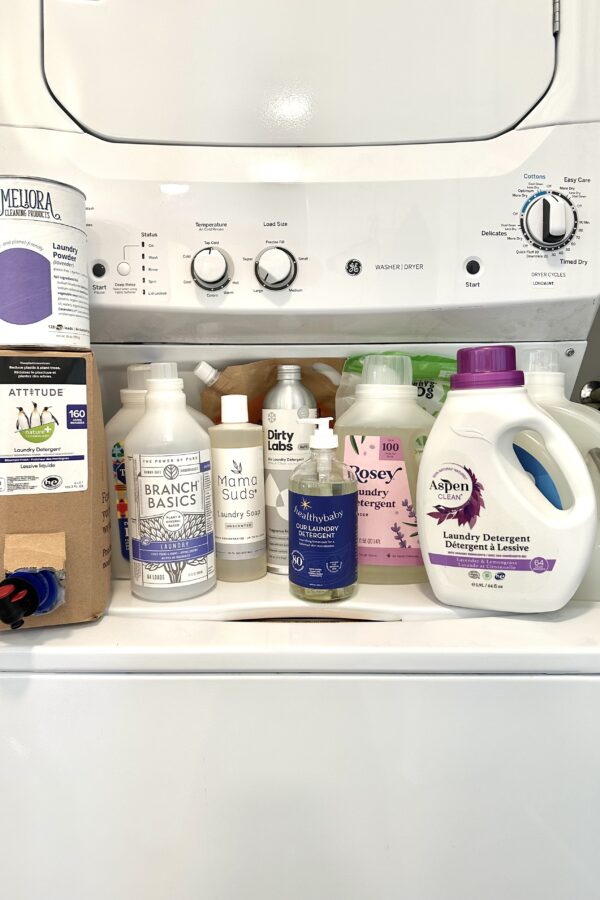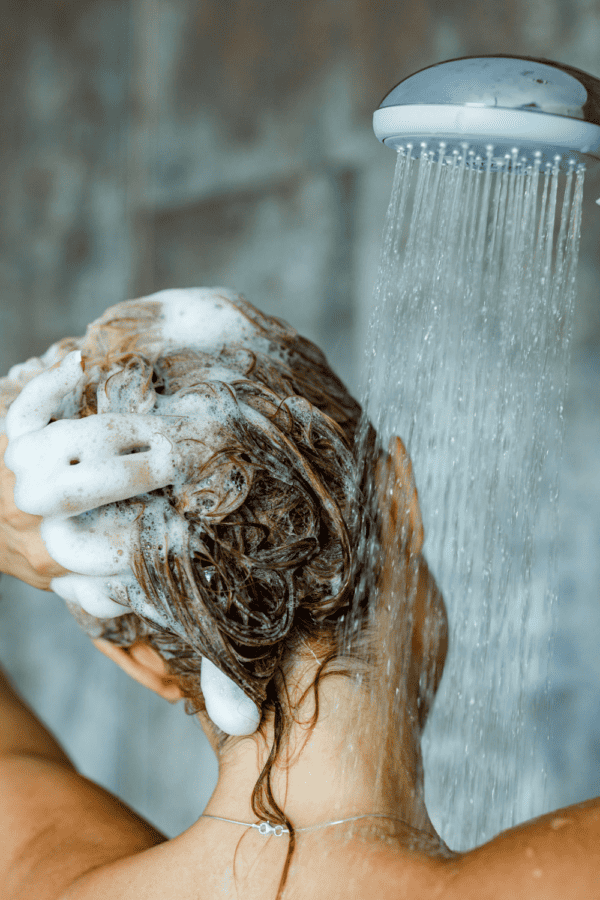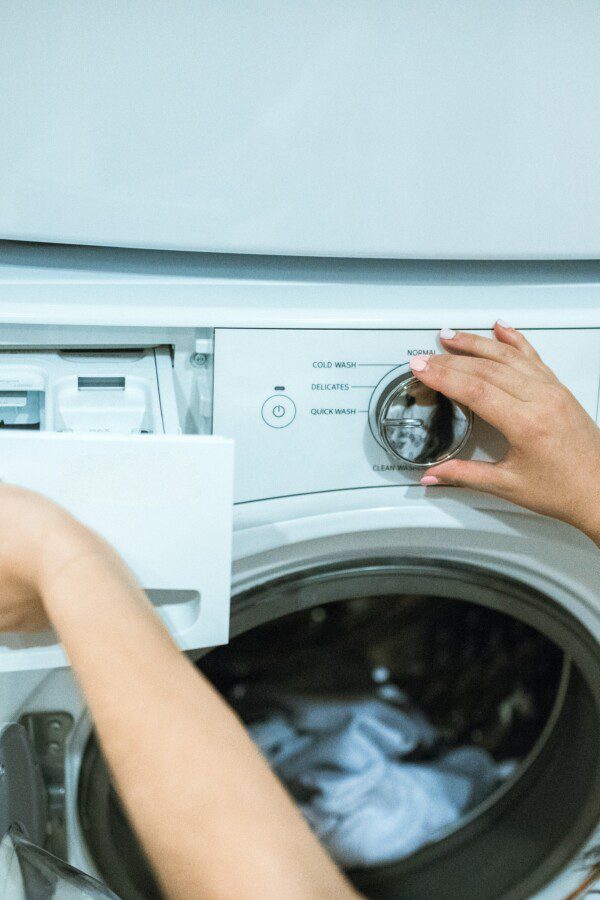If you walk through Target’s home cleaning aisles, you’ll find Everspring’s laundry detergent, air fresheners, and other home care products under a big green Target “Clean” logo. (You’ll also see similar brands like Seventh Generation, Mrs. Meyer’s, 9 Elements, Method, and Grove Collaborative.)
Glancing at Everspring’s branding and tagline (“Down-to-earth solutions that are up to Earth’s standards”), you might automatically think Everspring is non-toxic and eco-friendly.
But unfortunately, these big brands have been accused of greenwashing: marketing products as “clean” or “sustainable” when they’re really not. So we’re taking a look at Everspring’s ingredients to find out if they’re really non-toxic and eco-conscious.
IN A NUTSHELL
- Everspring is a Target-owned brand that offers cleaning sprays, hand soap, laundry detergent, air fresheners, and paper products like paper towels, toilet paper, and disposable plates.
- Everspring’s products are free from many of the most problematic ingredients found in other home care products, such as endocrine-disrupting phthalates.
- Everspring still uses ingredients that may be irritating for some individuals, especially those with sensitive skin or allergies.
- Even though Everspring says their products are free from synthetic fragrances, they don’t always actually list the specific ingredients used in their fragrances, and there’s room for more transparency here.
- From an environmental sustainability standpoint, Everspring has pros and cons. Even though they do use quite a bit of plastic package, they also offer concentrated and refillable options to cut down on waste. They use some renewable materials such as soy and sugarcane, which may be a bit better than alternatives but have still been linked to deforestation.
Table of Contents
- IN A NUTSHELL
- A Quick Overview on Everspring
- A Look at Everspring’s Ingredients
- Pros
- Free from the “Worst” Ingredients
- Mostly Plant-Derived Ingredients
- Concentrates & Refillable Options Available for Less Waste
- 100% Soy Wax Candles
- Cons
- What About the Fragrances?
- What About Their Paper Products?
- Too Many Different Products?
- Is Everspring Greenwashed?
- More FAQs About Everspring
This article contains affiliate links, which means we may earn a commission if you decide to make a purchase.
A Quick Overview on Everspring

Everspring is a Target-owned brand that offers a variety of home care products, such as:
- Household cleaning sprays (all-purpose, disinfecting, glass, shower, tub & tile, granite & stone, floor cleaner)
- Hand soap
- Laundry detergent
- Paper products (cleaning wipes, paper towels, toilet paper, tissues, disposable plates & bowls)
- Air fresheners (room sprays, sachets, essential oils, candles)
Launched in 2019, Target says Everspring was created because they wanted to provide a safer and more sustainable home care line that was still just as effective as more conventional cleaning products.
A Look at Everspring’s Ingredients
When it comes to the ingredients in consumer products, there are a lot of legal loopholes, lack of regulation, and general grey area. Companies are allowed to call something “clean” or “non-toxic” or “eco-friendly” without actually meeting any specific set of stipulations.
In reality, this usually means things exist somewhere on a spectrum. One brand’s products may be better than those from a more “conventional” brand, while at the same time still containing ingredients that some consumers may want to avoid.
So, let’s look at the potential pros and cons of Everspring’s products so you can decide for yourself if you want to use their products.
Pros
Free from the “Worst” Ingredients
All of Everspring’s products come with the Target “Clean” label, which means they’re free from a lot of the most concerning ingredients, including endocrine-disrupting phthalates.
Note that Target’s “Clean” label isn’t perfect, though. For example, products with the label are free from propyl- & butyl-parabens, but not explicitly free from all parabens, which is not ideal. (We were not able to find parabens in any of Eversprings products, though, so that’s good news.)
Mostly Plant-Derived Ingredients
If you check the label, most of Everspring’s products are 96-98% biobased, which means most of their ingredients are derived from plants. This doesn’t automatically make them clean or sustainable, as there are a lot of different factors to consider. How are the plants sourced? What chemicals are used to transform the ingredient from a plant into the final product? Do any of those chemicals remain in the end result? And can the final product even still be considered natural?
That being said, plant-based ingredients are generally a better option compared to synthetic, petroleum-based ingredients which are more likely to be sourced and processed in an environmentally unsustainable way and are also more likely to contain ingredients that may be unhealthy to humans as well.
Concentrates & Refillable Options Available for Less Waste
Even though Everepring’s products are far from “zero waste,” (they still use quite a bit of plastic packaging), they do offer a lot of concentrates and refill options. So if you want to refill your bottle of all-purpose or bathroom cleaner, you can buy a little sachet and dissolve it into whatever bottle you want. Or if you want to refill your hand soap bottle, you can buy a big pouch of soap, which refills a bottle about three times.
They don’t have bulk refills options for the laundry detergent, but they do have ultra-concentrated bottles, which helps to at least cut back on the amount of plastic used.
100% Soy Wax Candles
Everspring’s scented candles are made with 100% soy wax. Like with a lot of other things, there are nuances here. Soy is an overall healthier option compared to paraffin wax, and it tends to be more affordable compared to other natural wax options such as beeswax, coconut, or tallow.
That being said, the soy industry is not exactly the most sustainable one. Additionally, not only are most soybeans sprayed with heavy amounts of pesticides, but they also require several harsh chemicals to turn them from a plant into a wax. If you want, you can read more in our guide to soy candles.

Cons
Some “Not-Great” Ingredients
Even though Everspring’s products are free from a lot of harsh chemicals, they do still contain ingredients that some people may want to avoid—especially those with sensitive skin, eczema, allergies, or similar sensitivities.
Let’s look at those ingredients:
Sodium lauryl sulfate (SLS)
For many people, sodium lauryl sulfate (SLS) is fine, especially when it’s used in proper concentrations and washed off the skin or fabric after use. However, it’s still an irritant, so those with sensitive skin, eczema, or similar conditions may want to avoid it when possible. You can read more about SLS here.
Isothiazolinone preservatives
Methylisothiazolinone and benzisothiazolinone are synthetic preservatives that are commonly used in personal and home care products, even those that are advertised as “green.” Similar to SLS, these can be irritating to the skin, eyes, and lungs. So while they may not be in the “worst” category, they may still exacerbate things for individuals with pre-existing problems.
Ethoxylated ingredients
Another not-terrible-but-not-great category of ingredients are ethoxylated ingredients. These include things like Laureth-6 (found in Everspring’s laundry detergent) and Polysorbate 20 (found in Everspring’s all-purpose cleaner).
The concern with these ingredients actually comes from contamination during the manufacturing process. There are two main chemicals of concern that are used to process ethoxylated ingredients: 1,4 dioxane and ethylene oxide.
Ethylene oxide is an irritant that’s known to cause multiple types of cancer and infertility. And 1,4 dioxane is also a known carcinogen. These ingredients aren’t added intentionally (and therefore won’t be found on any ingredient labels), but they can be left over in the final product.
Ethoxylated ingredients definitely aren’t the worst toxicants around, and they are so widespread in consumer products that they’re practically impossible to avoid completely. But many consumers still want to be aware of them because of those contamination concerns. There are cleaning products on the market that don’t use them (like Branch Basics and Force of Nature).
Natural allergens
Natural fragrance allergens such as linalool and limonene are used in a lot of personal care and cleaning products—even natural ones. For most people, these ingredients are harmless, but for people with allergies and other sensitivities, they can be irritating.
Everspring offers a Free & Clear option for their laundry detergent and hand soap, but they don’t offer any unscented options for their cleaning sprays. So if you or someone in your home needs a cleaner that is completely fragrance-free, you’ll have to go with another brand (again, we recommend Branch Basics and Force of Nature for this).

What About the Fragrances?
Now let’s dive a little deeper into the fragrances used in Everspring’s products, since this is where a lot of toxicants can hide.
The good news is that Everspring says its products are all free from synthetic fragrances, which are often petroleum-based. Just because a fragrance is synthetic does not automatically mean it’s toxic or bad, but many of the problematic fragrance ingredients (endocrine disruptors, carcinogens, etc.) are synthetic.
Some of Everspring’s products contain full fragrance ingredient lists right on the bottle (like the Room Sprays), but others (like the all-purpose cleaners and laundry detergents) don’t actually list the fragrance ingredients.
This is not ideal because we believe consumers deserve to know what’s in the products they buy so that they can make the best decision for their own health.
Everspring’s bottles contain words like “Naturally-Derived Fragrance,” “100% Natural Fragrance,” and “a blend of essential oils and plant extracts,” and this is where some confusion comes in. What do these words actually mean?
“Naturally-Derived” does not always mean “natural.” Some ingredients and materials can go through so much processing that they are considered a synthetic or semi-synthetic by the time they’re turned from a plant into something else.
“Natural fragrances” are similar to essential oils, but they’re not the same thing. They’re mostly made in a lab and can contain synthetic additives.
We won’t dive too deep into this issue here, but the point is that this just creates confusion for consumers about what’s actually in the products they’re buying.
Additionally, Everspring’s ingredient lists state that the product “Contains fragrance allergens,” but again, it doesn’t say which allergens they actually are. Some other brands are more clear on these allergens. For example, if you look at the back of this 9 Elements detergent, you can see that the specific allergen it contains is Limonene. This can be really helpful for people who want or need to avoid specific allergens (even if they’re natural).
What About Their Paper Products?
Now let’s take a look at the pros and cons of Everspring’s paper products, like their paper towels, toilet paper, tissues, and disposable plates & bowls.
The paper towels, toilet paper, and facial tissues are made with recycled paper. From an environmental standpoint, this is definitely better than using virgin resources; however, from a toxicant standpoint, recycled paper can contain BPA. This is because it can contain recycled thermal paper (receipts, airline tickets, etc.) and newspapers, which use BPA in the printing process.
When buying these types of paper products, you also may want to consider the bleaching method used. Everspring claims their paper towels and TP are “whitened without chlorine bleach.” It’s unclear, however, what method is actually used to whiten them, since there are several different types with varying levels of chemicals used. (You can read more about that here.) That being said, all of those methods are at least better than the more conventional way of bleaching.
Their paper plates and bowls are made out of sugarcane, which may or may not be more sustainable than using regular paper, since it is also linked to deforestation.
Additionally, they advertise as being “certified compostable,” but when you read the fine print, you’ll see that they’re actually only compostable in a commercial facility. This isn’t ideal because most people just aren’t going to go to the effort of taking their trash to a commercial composting facility.
At the end of the day, you’ll have to either choose if you want to use these products or not based on your own priorities, or switch to reusables instead of disposables.

Too Many Different Products?
Everspring offers many different cleaning sprays: all-purpose, bathroom, disinfectant, shower, wood, tub & tile, granite…
Whether this is a pro, con, or neither depends on the individual. Some people like using different products for cleaning their kitchen, their toilet, their shower, etc.
But on the other hand, this not only tends to lead to more waste, but it also just means more ingredient lists to read and sort through! Using a truly all-purpose cleaner that you can use for every (or almost every) part of your home tends to be an easier, cheaper, and less confusing way to transition to a non-toxic cleaning routine.
Is Everspring Greenwashed?
It’s a great question, and one that might not have a straightforward “yes” or “no” answer.
In many ways, Everspring’s products are safer than its conventional counterparts, but there’s still room for improvement. Many of their cleaning products still contain potentially-irritating ingredients, and they’re not always transparent about the fragrance ingredients.
P.S. Check out this guide for our favorite non-toxic cleaning products for your home.
PROS
- Products are free from the “worst” ingredients, such as phthalates
- Most products are 96-98% plant-derived
- Free & Clear option is available for laundry detergent and hand soap
- Prices are in the same range as more ‘conventional’ cleaning products (i.e. Tide, Clorox, etc.)
- Easily accessible at Target
- Concentrates and refill options available to cut down on plastic waste
CONS
- Several ingredients may be irritating, especially those with sensitive skin, allergies, or similar conditions
- Lack of transparency on fragrances
- Still uses quite a bit of plastic packaging
More FAQs About Everspring
Is Everspring organic?
No. Although Everspring uses a lot of plant-based ingredients, none of these ingredients are organic.
Who owns Everspring cleaning products?
Everspring is owned by Target Brands, Inc.
Does Everspring disinfect?
Everspring’s generic all-purpose cleaners, detergents, and hand soaps do not disinfect, but they do offer several disinfecting sprays, which are available in Lemon & Mint, Lavender & Bergamot, and Citrus Basil. The active ingredient they use to disinfect is Citric Acid, which is much less harsh compared to alternatives like bleach or ammonia.
Does Everspring have phthalates?
Nope! All Everspring products come with the Target “Clean” label, which means they are free from phthalates.
Does Everspring have ammonia?
No. Everspring’s cleaning products (including the disinfecting sprays) are free from ammonia.
Is Everspring cruelty free and/or vegan?
Although Everspring’s products appear to be free from animal products and not tested on animals, it’s unclear whether they’re truly cruelty-free and/or vegan. They do come with Target’s cruelty-free label, which states that “A product has an independent third-party certification on pack or unqualified on-pack marketing claim relating to being cruelty-free and/or not tested on animals.” However, they don’t say which third party label Everspring has. Additionally, Target’s cruelty-free label has faced some scrutiny.





If these are not “organic” and “free from potential sensitivities”, why are the continued to sold in stores such as Home Goods, TJMaxx, Marshalls, etc???
Unfortunately, the US (and many other countries) lacks regulation when it comes to chemicals. Many chemicals that are on the market were grandfathered into approval without being tested for safety. Most formulations are only tested for acute, short-term effects (such as skin rash) and not for the potential effects of longer term exposures, such as cancer or endocrine-disruption. You may find this article helpful, if you want to learn more: https://thefiltery.com/non-toxic-living-myths-misconceptions/
Awful!!! Worst so called cleaning solution I’ve ever used!!! What a waste of money!!! I’ll never buy this crap again!! Would NOT recommend this stuff to anyone !!!